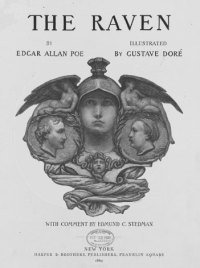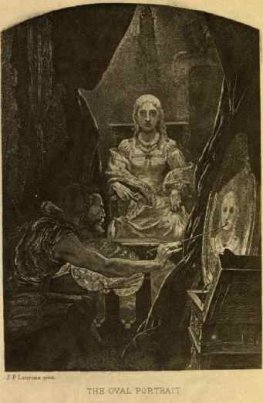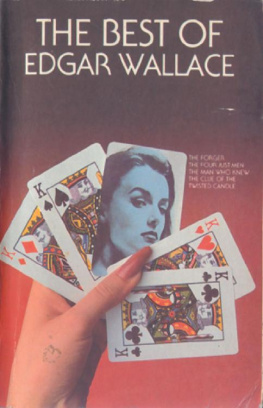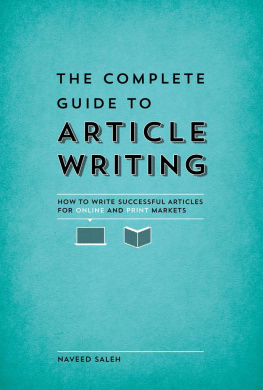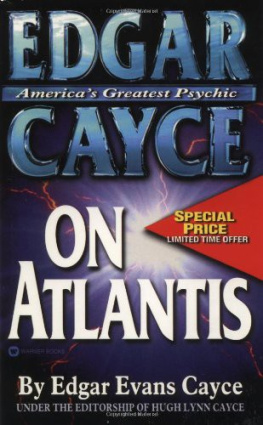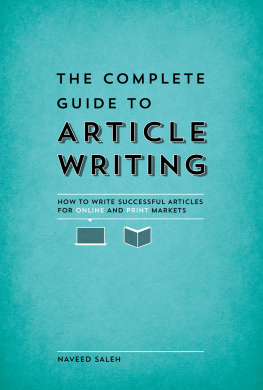Edgar Poe - How to Write a Blackwood Article
Here you can read online Edgar Poe - How to Write a Blackwood Article full text of the book (entire story) in english for free. Download pdf and epub, get meaning, cover and reviews about this ebook. genre: Prose / Humor. Description of the work, (preface) as well as reviews are available. Best literature library LitArk.com created for fans of good reading and offers a wide selection of genres:
Romance novel
Science fiction
Adventure
Detective
Science
History
Home and family
Prose
Art
Politics
Computer
Non-fiction
Religion
Business
Children
Humor
Choose a favorite category and find really read worthwhile books. Enjoy immersion in the world of imagination, feel the emotions of the characters or learn something new for yourself, make an fascinating discovery.

How to Write a Blackwood Article: summary, description and annotation
We offer to read an annotation, description, summary or preface (depends on what the author of the book "How to Write a Blackwood Article" wrote himself). If you haven't found the necessary information about the book — write in the comments, we will try to find it.
How to Write a Blackwood Article — read online for free the complete book (whole text) full work
Below is the text of the book, divided by pages. System saving the place of the last page read, allows you to conveniently read the book "How to Write a Blackwood Article" online for free, without having to search again every time where you left off. Put a bookmark, and you can go to the page where you finished reading at any time.
Font size:
Interval:
Bookmark:
How to Write a Blackwood Article
By Edgar Allan Poe
"In the name of the prophetsfigs!!"
Cry of Turkish fig-peddler.I presume everybody has heard of me. My name is the Signora Psyche Zenobia. This I know to be a fact. Nobody but my enemies ever calls me Suky Snobbs. I have been assured that Suky is but a vulgar corruption of Psyche, which is good Greek, and means "the soul" (that's me, I'm all soul) and sometimes "a butterfly," which latter meaning undoubtedly alludes to my appearance in my new crimson satin dress, with the sky-blue Arabian mantelet, and the trimmings of green agraffas, and the seven flounces of orange-colored auriculas. As for Snobbsany person who should look at me would be instantly aware that my name wasn't Snobbs. Miss Tabitha Turnip propagated that report through sheer envy. Tabitha Turnip indeed! Oh the little wretch! But what can we expect from a turnip? Wonder if she remembers the old adage about "blood out of a turnip," &c.? [Mem. put her in mind of it the first opportunity.] [Mem. againpull her nose.] Where was I? Ah! I have been assured that Snobbs is a mere corruption of Zenobia, and that Zenobia was a queen(So am I. Dr. Moneypenny always calls me the Queen of the Hearts)and that Zenobia, as well as Psyche, is good Greek, and that my father was "a Greek," and that consequently I have a right to our patronymic, which is Zenobia and not by any means Snobbs. Nobody but Tabitha Turnip calls me Suky Snobbs. I am the Signora Psyche Zenobia.
As I said before, everybody has heard of me. I am that very Signora Psyche Zenobia, so justly celebrated as corresponding secretary to the " Philadelphia , Regular, Exchange, Tea, Total, Young, Belles, Lettres, Universal, Experimental, Bibliographical, Association, To, Civilize, Humanity." Dr. Moneypenny made the title for us, and says he chose it because it sounded big like an empty rum-puncheon. (A vulgar man that sometimesbut he's deep.) We all sign the initials of the society after our names, in the fashion of the R. S. A., Royal Society of Artsthe S. D. U. K., Society for the Diffusion of Useful Knowledge, &c, &c. Dr. Moneypenny says that S. stands for stale, and that D. U. K. spells duck, (but it don't,) that S. D. U. K. stands for Stale Duck and not for Lord Brougham's societybut then Dr. Moneypenny is such a queer man that I am never sure when he is telling me the truth. At any rate we always add to our names the initials P. R. E. T. T. Y. B. L. U. E. B. A. T. C. H. that is to say, Philadelphia, Regular, Exchange, Tea, Total, Young, Belles, Lettres, Universal, Experimental, Bibliographical, Association, To, Civilize, Humanityone letter for each word, which is a decided improvement upon Lord Brougham. Dr. Moneypenny will have it that our initials give our true characterbut for my life I can't see what he means.
Notwithstanding the good offices of the Doctor, and the strenuous exertions of the association to get itself into notice, it met with no very great success until I joined it. The truth is, the members indulged in too flippant a tone of discussion. The papers read every Saturday evening were characterized less by depth than buffoonery. They were all whipped syllabub. There was no investigation of first causes, first principles. There was no investigation of any thing at all. There was no attention paid to that great point, the "fitness of things." In short there was no fine writing like this. It was all lowvery! No profundity, no reading, no metaphysicsnothing which the learned call spirituality, and which the unlearned choose to stigmatize as cant. [Dr. M. says I ought to spell "cant" with a capital Kbut I know better.]
When I joined the society it was my endeavor to introduce a better style of thinking and writing, and all the world knows how well I have succeeded. We get up as good papers now in the P. R. E. T. T. Y. B. L. U. E. B. A. T. C. H. as any to be found even in Blackwood. I say, Blackwood, because I have been assured that the finest writing, upon every subject, is to be discovered in the pages of that justly celebrated Magazine. We now take it for our model upon all themes, and are getting into rapid notice accordingly. And, after all, it's not so very difficult a matter to compose an article of the genuine Blackwood stamp, if one only goes properly about it. Of course I don't speak of the political articles. Everybody knows how they are managed, since Dr. Moneypenny explained it. Mr. Blackwood has a pair of tailor's-shears, and three apprentices who stand by him for orders. One hands him the "Times," another the "Examiner" and a third a "Culley's New Compendium of Slang-Whang." Mr. B. merely cuts out and intersperses. It is soon donenothing but "Examiner," "Slang-Whang," and "Times"then "Times," "Slang-Whang," and "Examiner"and then "Times," "Examiner," and "Slang-Whang."
But the chief merit of the Magazine lies in its miscellaneous articles; and the best of these come under the head of what Dr. Moneypenny calls the bizarreries (whatever that may mean) and what everybody else calls the intensities. This is a species of writing which I have long known how to appreciate, although it is only since my late visit to Mr. Blackwood (deputed by the society) that I have been made aware of the exact method of composition. This method is very simple, but not so much so as the politics. Upon my calling at Mr. B.'s, and making known to him the wishes of the society, he received me with great civility, took me into his study, and gave me a clear explanation of the whole process.
"My dear madam," said he, evidently struck with my majestic appearance, for I had on the crimson satin, with the green agraffas, and orange-colored auriclas. "My dear madam," said he, "sit down. The matter stands thus: In the first place your writer of intensities must have very black ink, and a very big pen, with a very blunt nib. And, mark me, Miss Psyche Zenobia!" he continued, after a pause, with the most expressive energy and solemnity of manner, "mark me!that penmustnever be mended! Herein, madam, lies the secret, the soul, of intensity. I assume upon myself to say, that no individual, of however great genius ever wrote with a good penunderstand me,a good article. You may take, it for granted, that when manuscript can be read it is never worth reading. This is a leading principle in our faith, to which if you cannot readily assent, our conference is at an end."
He paused. But, of course, as I had no wish to put an end to the conference, I assented to a proposition so very obvious, and one, too, of whose truth I had all along been sufficiently aware. He seemed pleased, and went on with his instructions.
"It may appear invidious in me, Miss Psyche Zenobia, to refer you to any article, or set of articles, in the way of model or study, yet perhaps I may as well call your attention to a few cases. Let me see. There was 'The Dead Alive,' a capital thing!the record of a gentleman's sensations when entombed before the breath was out of his bodyfull of tastes, terror, sentiment, metaphysics, and erudition. You would have sworn that the writer had been born and brought up in a coffin. Then we had the 'Confessions of an Opium-eater'fine, very fine!glorious imaginationdeep philosophy acute speculationplenty of fire and fury, and a good spicing of the decidedly unintelligible. That was a nice bit of flummery, and went down the throats of the people delightfully. They would have it that Coleridge wrote the paperbut not so. It was composed by my pet baboon, Juniper, over a rummer of Hollands and water, 'hot, without sugar.'" [This I could scarcely have believed had it been anybody but Mr. Blackwood, who assured me of it.] "Then there was 'The Involuntary Experimentalist,' all about a gentleman who got baked in an oven, and came out alive and well, although certainly done to a turn. And then there was 'The Diary of a Late Physician,' where the merit lay in good rant, and indifferent Greek both of them taking things with the public. And then there was 'The Man in the Bell ,' a paper by-the-by, Miss Zenobia, which I cannot sufficiently recommend to your attention. It is the history of a young person who goes to sleep under the clapper of a church bell, and is awakened by its tolling for a funeral. The sound drives him mad, and, accordingly, pulling out his tablets, he gives a record of his sensations. Sensations are the great things after all. Should you ever be drowned or hung, be sure and make a note of your sensationsthey will be worth to you ten guineas a sheet. If you wish to write forcibly, Miss Zenobia, pay minute attention to the sensations."
Font size:
Interval:
Bookmark:
Similar books «How to Write a Blackwood Article»
Look at similar books to How to Write a Blackwood Article. We have selected literature similar in name and meaning in the hope of providing readers with more options to find new, interesting, not yet read works.
Discussion, reviews of the book How to Write a Blackwood Article and just readers' own opinions. Leave your comments, write what you think about the work, its meaning or the main characters. Specify what exactly you liked and what you didn't like, and why you think so.


